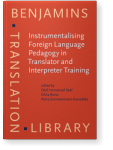Chapter 12
Foreign language acquisition writing exercises fostering translation trainees’ language and translation competence
This chapter intends to bring into beneficial interaction two language-based disciplines, i.e., foreign language acquisition (FLA) and translation studies (TS) and to demonstrate that the latter greatly benefits from the former. Concretely, by using FLA writing exercises in language courses for translation trainees (TT), it will be shown that the advantages from this implementation are not to be underestimated if these exercises are tailored to the needs of TT. Furthermore, these exercises not only improve the foreign language competence of the TT but also enhance other aspects of their overall translation competence. In order to tailor FLA exercises for translation trainees’ language courses, a specific methodological, didactical and conceptual basis is proposed which consists of an interactive implementation of constructivism, creativity theory, text linguistics and functional Skopos theory.
Article outline
- 1.Introduction
- 2.Outline of the methodological, didactical, and conceptual approach
- 2.1Constructivism as a basis for learning and knowledge acquisition
- 2.2Enhancing language perception and production by creativity theory methods
- 2.3Text linguistics and the criteria of textuality
- 2.4Skopos theory as the frame of reference of translational action
- 2.5Model(s) of translation competence
- 3.FLA-based TT-tailored language writing exercises
- 3.1Semi-open exercise: constructing sentences with semantically interconnected lexical material
- 3.1.1TT-tailored writing exercise 1
- 3.1.2Short analysis of the workflow
- 3.1.3Preliminary conclusions based on TT-tailored writing exercise 1
- 3.2Open exercise: Constructing short texts and different text genres with semantically unconnected lexical material
- 3.2.1TT-tailored writing exercise 2
- 3.2.2Short analysis of the workflow
- 3.2.3Preliminary conclusions based on TT-tailored writing exercise 2
- 4.Conclusion
-
Notes
-
References
